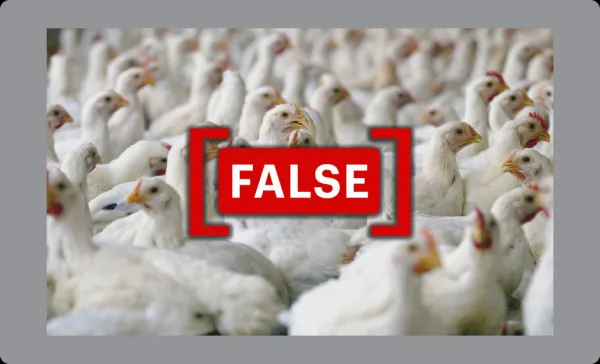By: Emmi Kivi
July 18 2023

IBV vaccines cause no risk to consumers, nor is it possible for humans to be exposed to the vaccine through consuming food products.
Context
A TikTok post claims that a vaccine that protects against infectious bronchitis virus (IBV) in chickens allows so-called elites to vaccinate the human population and pharmaceutical companies to collect revenue. The claim aligns the IBV vaccines for chickens with human vaccine programs against COVID-19. Accordingly, the vaccine may spread to humans through chicken consumer products, namely chicken meat and eggs, through the spike proteins used in mRNA vaccines. The claim has become popular in Finland, which began vaccinating its poultry against the IBV in June 2023.
In Fact
IBV is an avian infectious bronchitis virus that belongs to the genus Gammacoronaviruses. The virus can severely affect the chickens' well-being and the poultry industry's productivity. It can lead to severe respiratory disease in chickens, reduced egg quality, and decreased production. The virus spreads through the air, direct contact between chickens, or contaminated equipment but is harmless to humans. Several countries vaccinate poultry against the disease.
According to EU law, food-producing animals may only be treated with veterinary medicinal products that do not pose a risk to consumers. Veterinary officer Tita-Maria Muhonen, from the Finnish Medicines Agency Fimea, told Logically Facts, "IBV vaccines do not cause risks for consumers, and in practice, it is not possible for humans to be exposed to the vaccine through consuming chicken meat or eggs." Vaccinating chickens against IBV is not mandatory, but the Finnish Food Authority highly recommends it.
Veterinary vaccines are essential in protecting livestock from life-threatening diseases. They also reduce the need for antibiotics, support maintaining animal health and improve the supply of high-quality animal protein for consumption.
In Finland, veterinary medicinal products are strictly regulated, and their quality is monitored to ensure their safety and efficacy. Vaccines used in Finland must be authorized for use and in accordance with EU veterinary medicinal legislation. The Finnish Food Authority is Finland's Official Medicines Control Laboratory for veterinary vaccines.
As the Finnish Food Authority states, the avian IBV vaccines do not use the mRNA technology in human COVID-19 vaccines. Vaccines based on "old" vaccine technology containing dead and live attenuated IBV are on the market. "The inactivated and live-attenuated vaccine virus is quickly destroyed in the animal's body but triggers an immune response in the healthy animal. It protects the chicken from a respiratory infection by, for instance, antibodies. Although live-attenuated vaccines have not previously been used in Finland, most EU countries have used them for decades," veterinary officer Muhonen further disclosed to Logically Facts.
Logically Facts has previously disproved false claims that mRNA vaccines are administered into the food supply or livestock and covered false and misleading claims about the COVID-19 pandemic and the safety of mRNA vaccines.
The Verdict
No scientific evidence supports the claim that the vaccine against IBV for poultry could transfer to humans through chicken meat or eggs. In Finland, food-producing animals may only be treated with veterinary medicinal products that do not pose a risk to consumers. The vaccine against IBV is not mandatory, nor does it use mRNA technology. Therefore, we have marked the claim as false.